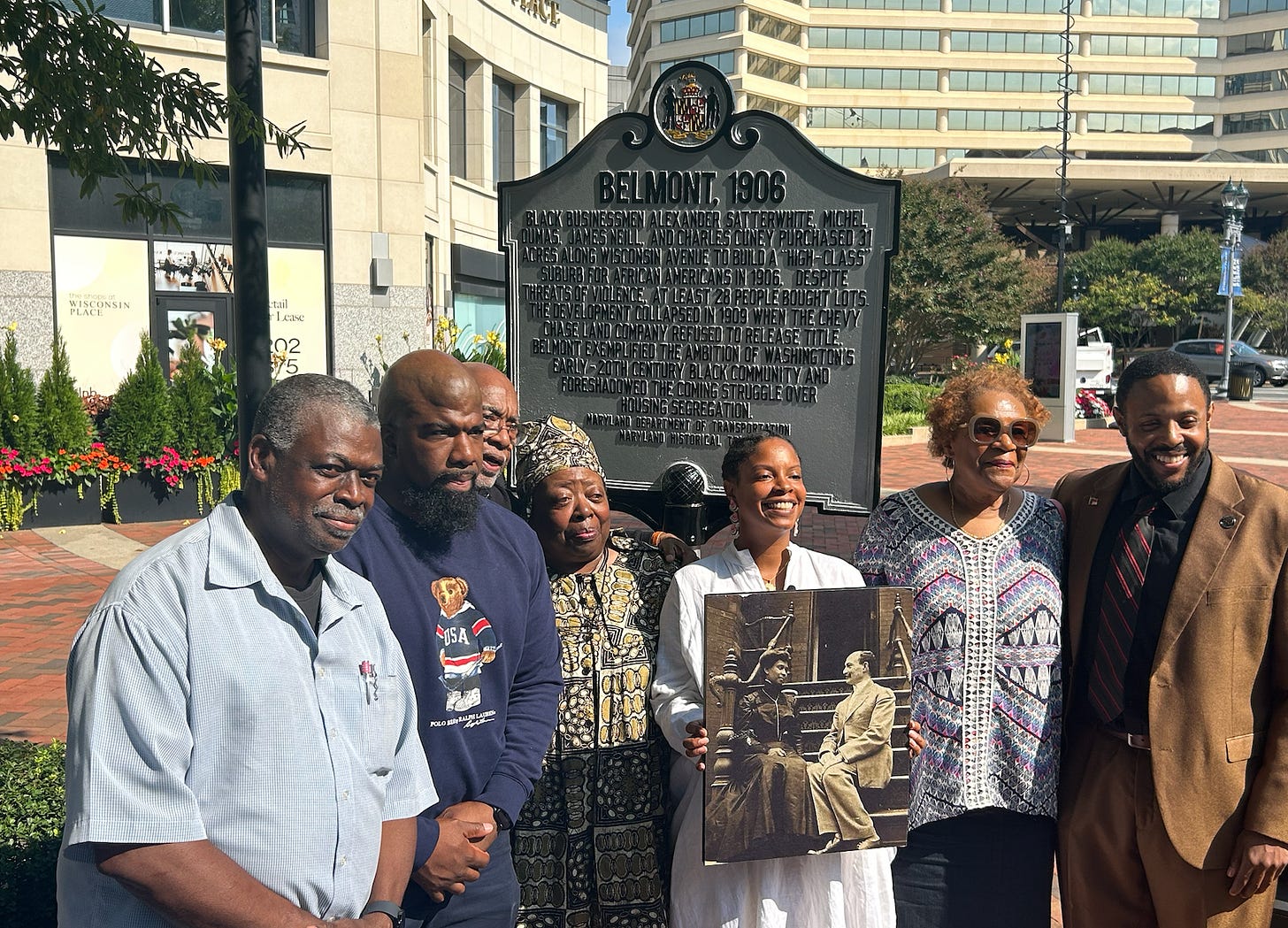
Maryland finally honors the Black suburb shut down by white developers
In 1906, four men tried to build an upscale Black suburb. White residents and developers shut them down before they could even start.
Maryland finally honors the Black suburb shut down by white developers
In 1906, four men tried to build an upscale Black suburb. White residents and developers shut them down before they could even start.
https://substack.com/profile/11804216-phil-lewisPhil Lewis
Sep 24, 2024

Descendants of the Belmont Syndicate stand in front of the newly unveiled historical marker. Photo: Phil Lewis.
In the early 20th century, four Black businessmen bought acres of land in Maryland, with plans of constructing a prosperous suburban neighborhood for Black Americans in valuable space near the Washington, D.C. line. But white landowners vehemently opposed the undertaking, and the group’s dreams of building the suburb were never actualized.
On Saturday, a historical marker was unveiled at the intersection of Western Avenue and Wisconsin Avenue — next to land where the Black suburb Belmont would have been. Commissioned by the Maryland State Department of Transportation, the marker is due to the efforts of public historians Kim Bender and Neil Flanagan.
The men — Charles Cuney, Michel Dumas, James Neill and Alexander Sautterwhite — called themselves the “Belmont Syndicate,” and they worked with a white man who acted as a straw buyer to obtain the land. The group was unapologetic in their efforts to advertise their plans for the suburb, running ads in both Black and white newspapers.
One ad, which ran in the Washington Post, exclaimed the headline "Colored People Attention,” and encouraged Black residents to purchase “an ideal suburban lot in the most beautiful and most rapidly improving section of Northwest Washington, Belmont Chevy Chase." The group offered lots starting at $400, and said the area would be the “only good subdivision in Washington where colored people are welcomed to buy.”
Nearly 30 residents took them up on the offer, but the backlash was swift.

The ad for the Belmont suburb. Photo: Eventbrite/The Washington Post.
When white residents in the Chevy Chase area found out about the Belmont Syndicate’s valiant plans, they pulled all the stops in order to prevent the Black suburb from existing. Residents made threats in local newspapers and even had the men arrested for no reason at all.
“To establish a negro colony at Belmont, practically at our doors and beyond the restraint of the District police force, would mean the impairment of our property values, a constant menace to our peace and security, and the destruction of the happiness of our homes,” one resident told The Washington Times.
It wasn’t the threat of lynching or arrest that halted the Belmont Syndicate’s plans. The project was stalled by the Chevy Chase Land Company, a real estate company founded by a white supremacist whose aim was to develop all-white neighborhoods. The company and its affiliates waged a legal war against the Belmont Syndicate that shut down the plans for for the suburb completely.
Felani Afrika Spivey, a descendant of Alexander Satterwhite, one of the Belmont Syndicate, helped unveil the marker Saturday at the intersection of Western Avenue and Wisconsin Avenue.
“This marker states the facts of what happened in this location in Chevy Chase in 1906 when my third great-uncle along with three men Black men purchased land to create an affluent Black community and it was halted,” Spivey explained.
“Without this marker, [Belmont] would be a rumor. It means a lot to me and my family for our legacy, and hopefully it helps us get reparations,” Spivey said.
Artist Crudup, another descendant and alumnus of the University of the District of Columbia, was also present for the unveiling. He spoke of the white developers efforts’ to bury as much information on Belmont as possible.
“There’s an African proverb that says truth pressed to the ground will rise to the top. To be standing here with my cousins and my son is the most miraculous spiritual accomplishment in my life,” he said, overcome with emotion. “This has always been an affluent area. We can all go forward from this.”
Learn more about the history of Belmont by watching the short documentary “Belmont: The Lost Plan for a Black Chevy Chase” below.



